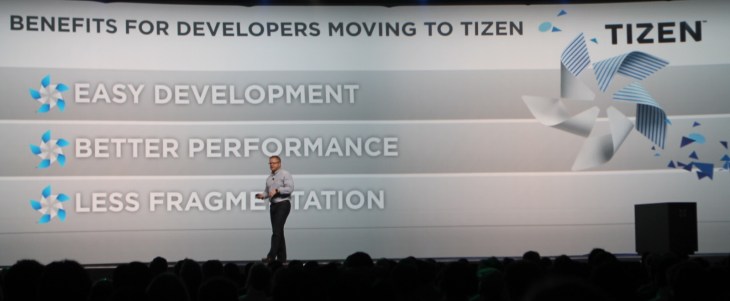Samsung is hoping to make it easier for developers to build apps for its smart TV devices. As part of that effort, the consumer electronics giant has decided to enable developers to leverage the Tizen operating system to do so.
Today at the Samsung Developer Conference, Samsung exec Eric Anderson talked up the company’s Tizen-based Smart TV SDK, which will replace the company’s former smart TV developer platform. The SDK is aimed at courting web developers to build apps for smart TVs, but also to enable more cross-platform apps within its ecosystem of devices.
Samsung has been trying to increase developer interest in Tizen for years, placing the Linux-based operating system in a number of its devices. That includes mobile phones like the Samsung Z and its Galaxy Gear watches.
The company touts cross-platform HTML5 and JavaScript support as the main reason for adopting Tizen, which could enable developers to bring web apps quickly onto its devices. But by putting Tizen into everything from phones to smartwatches to TVs, Samsung also stands to benefit from a bit of cross-platform, cross-device applications.
Unlike the smartphone industry, which is dominated by iOS and Android, the TV world is a largely fragmented mess. While Google has tried to provide a platform for CE makers to base their devices on, most manufacturers have rolled out their own proprietary platforms for app makers.
That means companies like Netflix and Hulu are largely stuck making and maintaining apps for dozens of different smart TV platforms. But moving to more of a web-based platform could speed up development time and also give app makers more flexibility in being able to update apps on the fly.
When it comes to Samsung’s TV environment in particular, Anderson said Tizen will provide a scalable user interface that will automatically adjust app layouts based on the available screen size of the device. He also noted that Tizen would allow developers to build across multiple devices and screens.
Anderson said that moving from Samsung’s existing smart TV developer platform to Tizen could be done in fewer than 40 hours, which would make it easy for developers who are already a part of its smart TV ecosystem to port their apps over. More importantly, however, it will facilitate the transfer of existing web apps onto the Samsung platform.
In the smart TV and Tizen development booths on the show floor, for instance, the company showed off the ability to move a piece of content from a phone to a TV to a smart fridge with a digital screen. It also touted cross-device unified storage, which would allow users to “access remote files in the local storage space, even across networks.”
